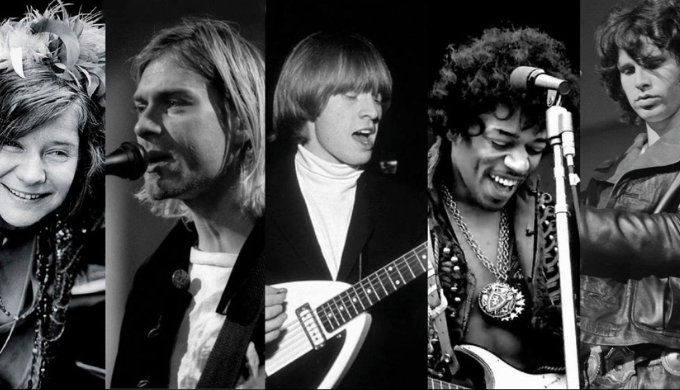The music industry is filled with legends, but few myths carry the same weight as the “27 Club.” This term refers to the group of artists who passed away at the young age of 27, leaving behind not only remarkable legacies but also an eternal question: what more could they have achieved if they had lived longer?
From the psychedelic ‘60s to the grunge era of the ‘90s and beyond, these stories have inspired countless documentaries, books, and even conspiracy theories. For some, it was the reckless lifestyle of rock’n’roll; for others, the crushing weight of fame or personal struggles.
What’s undeniable is that their music continues to resonate with audiences worldwide, influencing generations that came long after their deaths. Which of the “Club 27” artists is your favorite?
The artists of “Club 27”
Jim Morrison
The legendary frontman of The Doors became an icon not only for his haunting voice but also for his enigmatic stage presence and poetic lyrics. Morrison embodied rebellion and mystery, representing a generation that challenged every convention. His life in Paris ended abruptly in 1971 when he was found dead in his apartment’s bathtub under circumstances that remain unclear. Even in death, Morrison’s influence is undeniable, and The Doors’ catalog continues to inspire musicians and fans alike. He is remembered as a symbol of both artistic genius and self-destruction.
Jimi Hendrix
With his guitar, Hendrix reshaped the very sound of rock. His technical mastery, experimental use of feedback, and electrifying live performances made him one of the most influential musicians in history. Tragically, in 1970, he was found dead in London after an overdose of sleeping pills combined with alcohol. His death left a void in the rock scene that no one has truly filled since. Yet, his groundbreaking style continues to echo in every guitarist who dares to push boundaries. Hendrix wasn’t just a musician; he was a revolution.
Janis Joplin
Nicknamed the “Queen of Rock and Roll” and “the white blues queen,” Janis Joplin possessed a voice full of raw power, emotion, and soul. Her performances were nothing short of explosive, channeling both vulnerability and strength. In 1970, she died of a heroin overdose in Los Angeles, a shocking end to a career that had only just begun to flourish. Despite her brief time in the spotlight, Joplin remains a feminist icon and a trailblazer for women in rock. Her songs still feel as fresh and heartfelt as when she first sang them.
Kurt Cobain
As the voice of Generation X, Kurt Cobain propelled grunge into the mainstream with Nirvana. His music captured the angst and disillusionment of the ‘90s youth, with songs like Smells Like Teen Spirit becoming cultural anthems. In 1994, he was found dead in his Seattle home, with the official ruling being suicide. Cobain’s passing devastated fans worldwide and cemented his place as a tragic icon of authenticity and pain. Even decades later, Nirvana’s music continues to define an era and inspire countless artists.
Amy Winehouse
Amy Winehouse had a voice unlike any other: soulful, raw, and timeless. Blending jazz, soul, and R&B, she revived classic sounds with modern intensity. Her album Back to Black catapulted her to superstardom, but her struggles with addiction and the pressures of fame were highly publicized. In 2011, at just 27, she was found dead in her London home from alcohol poisoning. Though her career was brief, Amy left an indelible mark on music, remembered as both a brilliant artist and a vulnerable human being.
Brian Jones
As the founding member of the Rolling Stones, Brian Jones was the band’s original visionary. A multi-instrumentalist, he shaped the early sound of the group with his experimental flair. However, personal issues and substance abuse led to his departure from the band. Just a month later, in 1969, he was found dead in his swimming pool. A death still shrouded in mystery. Despite his short life, Jones’ influence on the Stones and rock music in general is undeniable, securing him a place in music history.
Robert Johnson
Perhaps the most mythical figure of the 27 Club, Robert Johnson is often said to have “sold his soul to the devil” at a crossroads in exchange for his extraordinary guitar skills. His life was short and mysterious, with only a handful of recordings that nonetheless revolutionized the blues. He died in 1938 under unclear circumstances, adding to the aura of legend that surrounds him. Johnson is regarded as the father of modern blues and a direct inspiration for countless rock musicians who followed.











